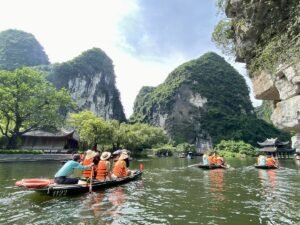Best Vietnam Ecotourism Experiences for Eco-Conscious Travelers
 ngocdiem
ngocdiem Vietnam, with its stunning landscapes and rich biodiversity, is a prime destination for Vietnam ecotourism. Its national parks, like Phong Nha-Ke Bang and Cat Tien, are home to endangered species and vital ecosystems, making their protection essential. Ecotourism plays a key role in preserving these natural treasures by promoting sustainable Vietnam travel that minimizes environmental impact while supporting conservation..
1. Why Choose Responsible Travel in Vietnam?
Traditional tourism can often have negative effects on the environment, contributing to deforestation, pollution, and the disruption of wildlife habitats. In popular destinations, large numbers of visitors can lead to overcrowding, waste accumulation, and damage to fragile ecosystems. This not only threatens the natural beauty of Vietnam but also impacts the lives of local communities who depend on these environments for their livelihoods.
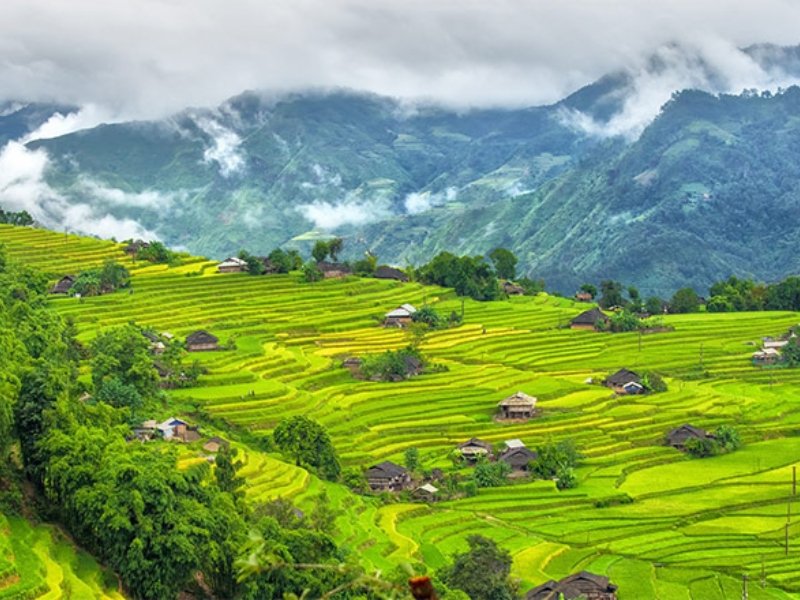
Choosing responsible travel in Vietnam helps mitigate these issues by promoting tourism practices that prioritize sustainability and respect for nature. By supporting local businesses, staying in eco-friendly accommodations, and following sustainable practices, travelers can ensure their visit leaves a positive impact. This type of travel benefits local communities by creating jobs, promoting cultural preservation, and raising awareness about the importance of environmental protection.
Sustainable Vietnam travel is a way to ensure that the country’s ecosystems remain intact while allowing future generations to experience the beauty of its national parks. By engaging in ecotourism, tourists directly contribute to the preservation of Vietnam’s natural resources, supporting conservation efforts and ensuring that these areas continue to thrive for years to come. In turn, this fosters a harmonious relationship between tourism and environmental sustainability.
🌿 Explore: Uncover the Secrets of Vietnam Rainforest and Its Biodiversity
2. Top National Parks in Vietnam for Ecotourism
Vietnam is home to several national parks that are perfect for Vietnam ecotourism, offering travelers a chance to experience the country’s rich biodiversity and stunning landscapes while contributing to conservation efforts.
Phong Nha-Ke Bang National Park is one of the most famous and biodiverse parks in Vietnam. Known for its massive limestone caves, lush jungles, and unique wildlife, it is a UNESCO World Heritage site and a haven for ecotourism. Visitors can explore caves like Son Doong Cave, the largest cave in the world, and see rare species like the saola, a critically endangered animal.
Cat Tien National Park, located in southern Vietnam, is another excellent destination for responsible travel in Vietnam. It’s home to diverse ecosystems, including dense rainforests and wetlands, and provides shelter to many endangered species such as the Javan rhinoceros. Tourists can enjoy activities like hiking, birdwatching, and canoeing while helping raise awareness about the park’s conservation efforts.


🌿 Explore: Quang Binh Expedition: Unraveling the Adventures of Central
Ba Na Hills Nature Reserve, near Da Nang, is known for its breathtaking views and rich biodiversity. The reserve is famous for its Golden Bridge and lush forests, offering an excellent opportunity for travelers to explore nature while supporting sustainable tourism. Ba Na Hills is also home to several endemic species, making it an important area for biodiversity conservation.
🌿 You can read more some information tour Da Nang in here:
- 🌳 Danang City and Ba Na Hills: A Captivating 4-Days Tour
- 🌳 Central Vietnam 3 Days 2 Nights Tour: Explore Da Nang and Hoi An
- 🌳 Danang and Hoi An Discovery in 4 Days
Other notable parks supporting ecotourism include Hoang Lien National Park, home to the famous Fansipan mountain, and Cuc Phuong National Park, which is the oldest national park in Vietnam and a sanctuary for endangered species like the Delacour’s langur. These parks offer unique opportunities for sustainable travel, combining adventure with conservation and helping travelers engage with the natural beauty of Vietnam responsibly.
3. How Sustainable Travel Supports Local Communities
Sustainable Vietnam travel plays a crucial role in supporting local communities by generating economic benefits while promoting environmental conservation. Ecotourism ensures that tourism revenue is directed toward preserving natural resources and improving the well-being of local residents. By visiting national parks and protected areas, tourists help fund conservation efforts, benefiting both the environment and the local economy.
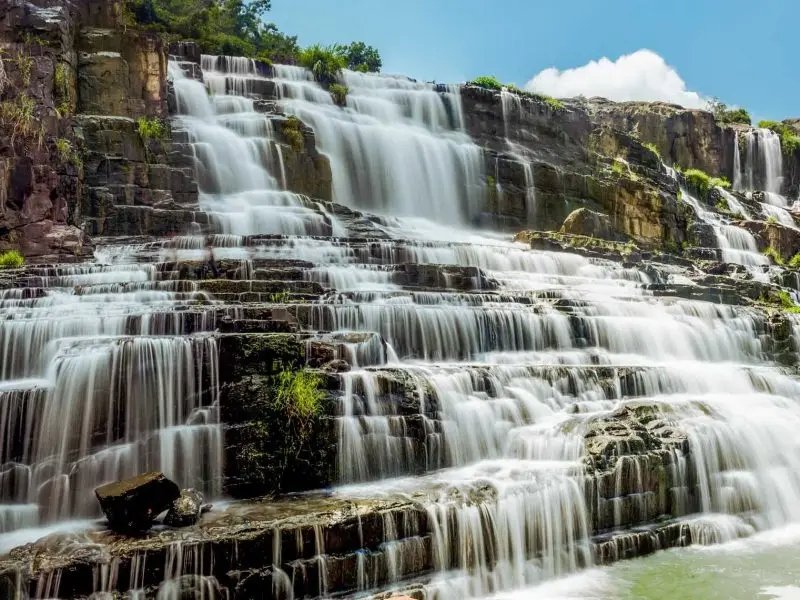

One of the key benefits of responsible travel in Vietnam is its ability to preserve local culture. When travelers choose sustainable options, they often stay in locally-owned accommodations and participate in cultural tours, giving back to the community. This helps preserve traditional customs, crafts, and languages while offering visitors a more authentic experience.
Furthermore, sustainable Vietnam travel creates jobs in local communities. Tour guides, hotel staff, and artisans all benefit from responsible tourism, providing them with stable incomes and promoting community development. Beyond economic advantages, ecotourism raises awareness about environmental issues and educates both locals and tourists on the importance of conservation, helping to protect the region’s ecosystems for the long term. How can you make your Vietnam adventure both unforgettable and responsible? Find out in our comprehensive sustainable tourism guide.
🌿 Explore: Vietnam National Parks: Your Ultimate Eco-Tourism Adventure
4. Tips for Sustainable Vietnam Travel
To ensure your visit to Vietnam supports the environment and local communities, here are some tips for sustainable Vietnam travel:
- 🌳 Choosing eco-friendly accommodations: Look for hotels, homestays, and resorts that practice sustainability by using renewable energy, reducing waste, and supporting local communities. Many eco-lodges in Vietnam are designed to minimize their environmental impact while providing an authentic, immersive experience.
- 🌳 Supporting local businesses and artisans: When shopping or dining, choose locally-owned businesses and markets that sell handmade crafts, local food, and sustainable products. This helps keep money within the community and supports traditional craftsmanship while reducing your carbon footprint.
- 🌳 Respecting wildlife and natural habitats: Always follow the guidelines set by national parks and reserves, such as staying on marked trails, not disturbing wildlife, and avoiding littering. By respecting nature, you ensure that future visitors will be able to experience Vietnam’s beauty in the same way you did.
- 🌳 Minimizing your carbon footprint during travel: Opt for eco-friendly transportation options when traveling within Vietnam, such as buses, trains, or bicycles, to reduce your environmental impact. Consider offsetting your carbon emissions by supporting tree planting projects or other environmental initiatives.
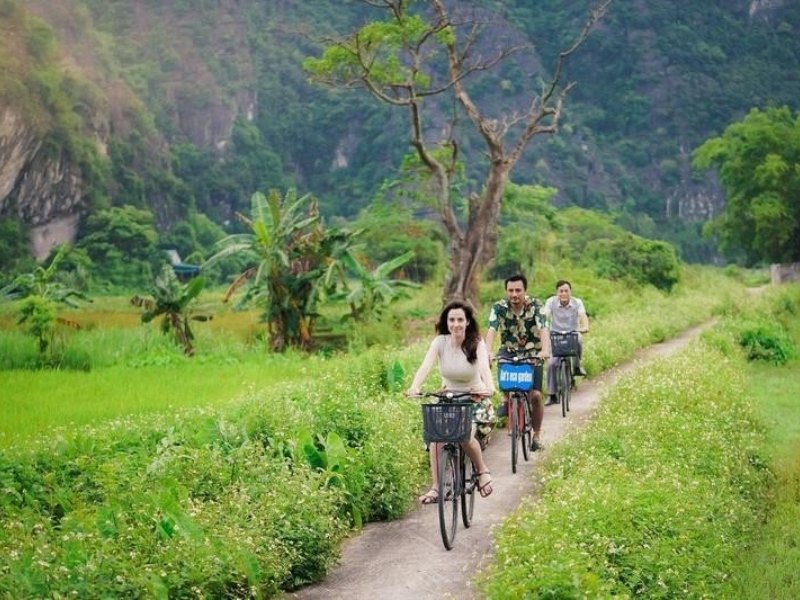

🌟 For more information somewhere in Vietnam and the latest updates, contact us via WhatsApp or visit the Sun Getaways Travel Fanpage. Or follow these posts to get the details if you want to:
5. Challenges and Future of Ecotourism in Vietnam
Despite the growing popularity of Vietnam ecotourism, there are still several challenges that national parks face in maintaining their ecological balance. One of the main concerns is overcrowding in popular tourist spots, which can put immense pressure on fragile ecosystems. Large numbers of tourists can lead to soil erosion, pollution, and disruption to local wildlife, diminishing the quality of the experience for both nature and travelers.
Additionally, Vietnam’s national parks often struggle with limited funding for conservation efforts. While ecotourism has the potential to generate revenue for preservation, much of this income is still not effectively used to address urgent environmental issues, such as poaching, illegal logging, and habitat destruction. Get insider tips on eco-resorts, responsible tours, and authentic cultural experiences in our complete guide to sustainable travel in Vietnam.
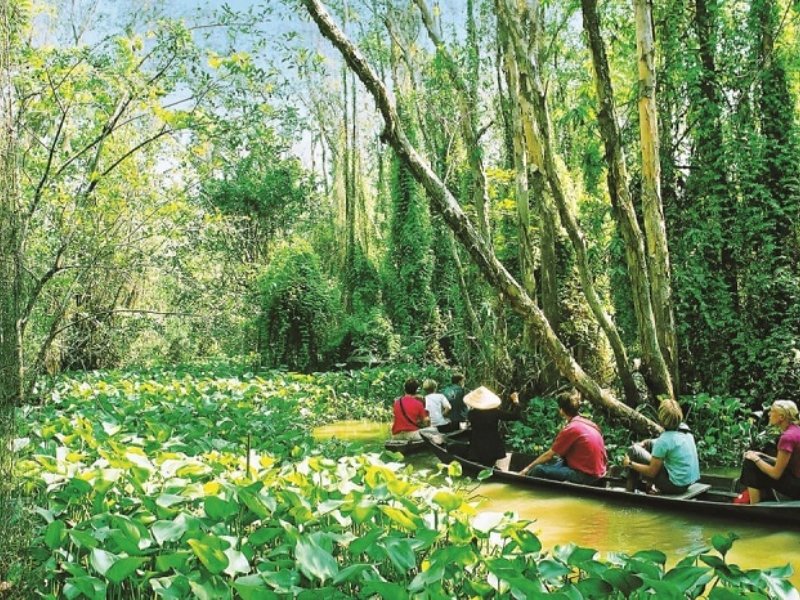

To ensure the future of responsible travel in Vietnam, there is a pressing need for better regulation and more effective sustainable policies. This includes stronger enforcement of environmental laws, responsible tourism guidelines, and incentives for businesses that adopt eco-friendly practices. Government support, along with collaboration between local communities, conservation organizations, and tourism operators, is essential to create a sustainable tourism model that benefits all stakeholders.
🌿 Explore: Vietnam Wildlife Tours: Best National Parks for Animal Spotting
6. Conclusion
Ecotourism in Vietnam plays a vital role in protecting the country’s stunning natural landscapes and wildlife. By choosing sustainable Vietnam travel options, we not only contribute to the preservation of these ecosystems but also support local communities, providing them with economic opportunities and helping preserve their cultures. Responsible travel in Vietnam is more than just about enjoying nature – it’s about preserving it for future generations.
Plan your next ecotourism adventure with Sun Getaways Travel – explore Vietnam responsibly and help protect its natural treasures!
You can read more about Vietnam “Vietnam birdwatching“, “Vietnam waterfalls“, “Vietnam trekking“
Ask a question
Leave a Comment (0)
No questions yet. Be the first to ask a question!













